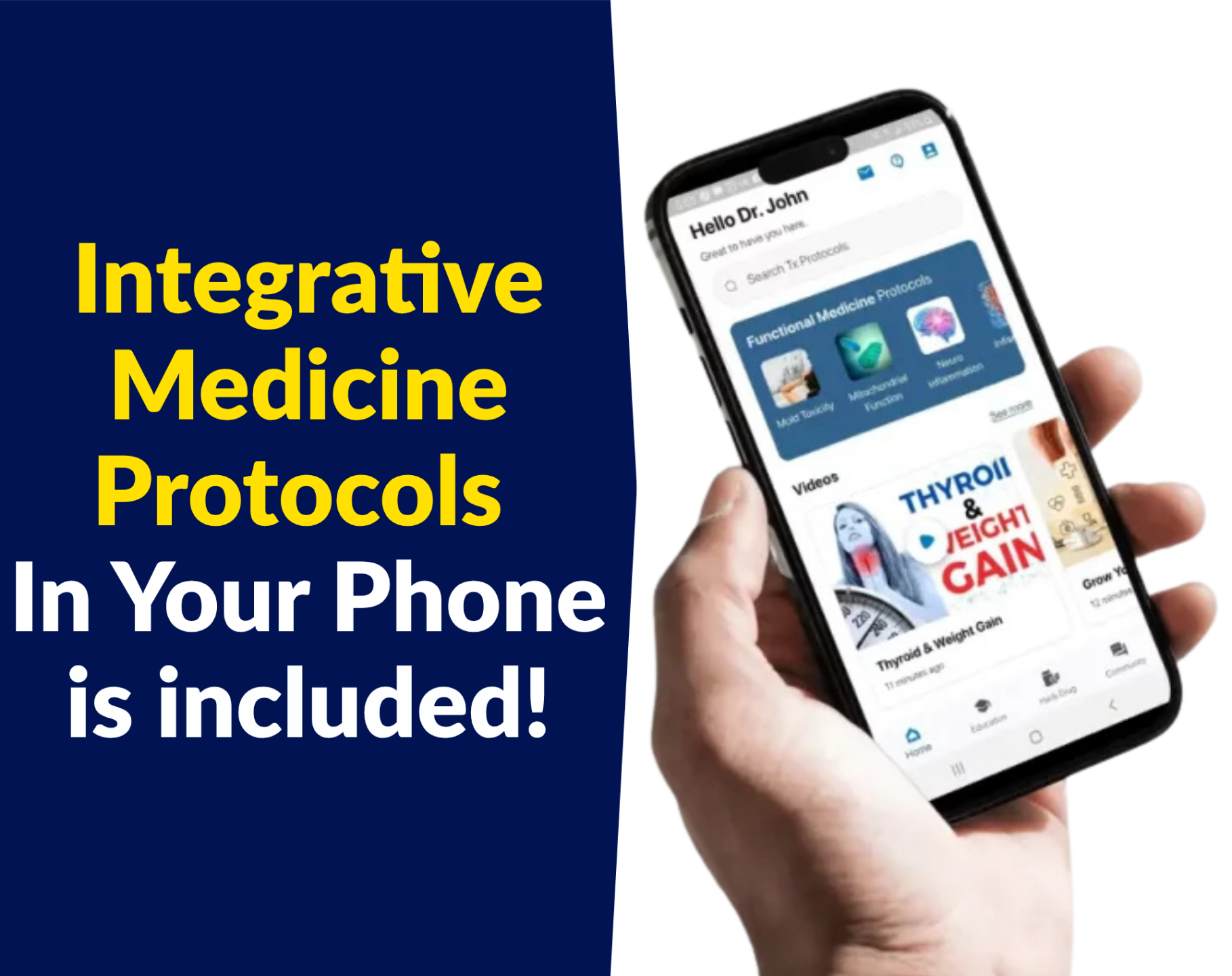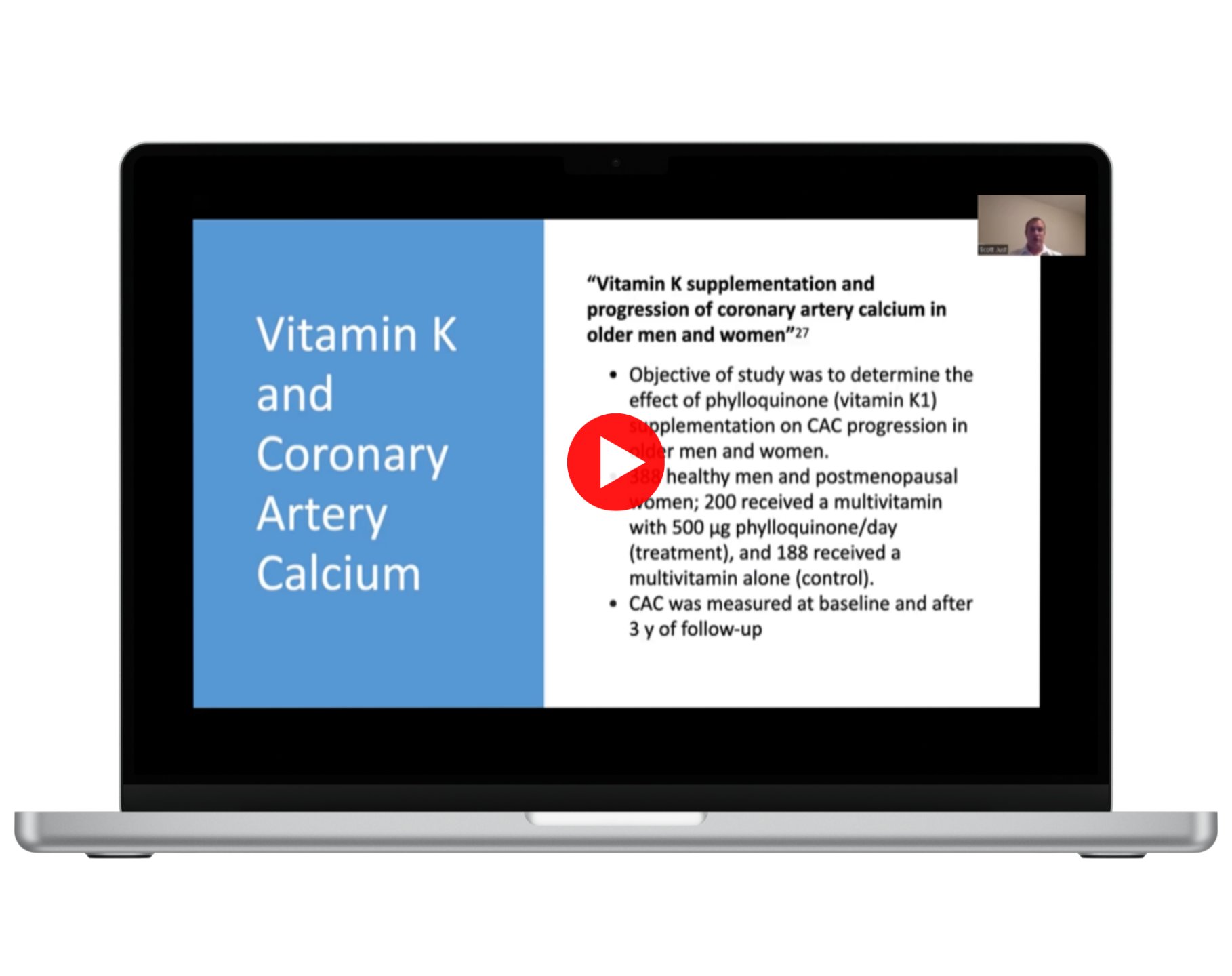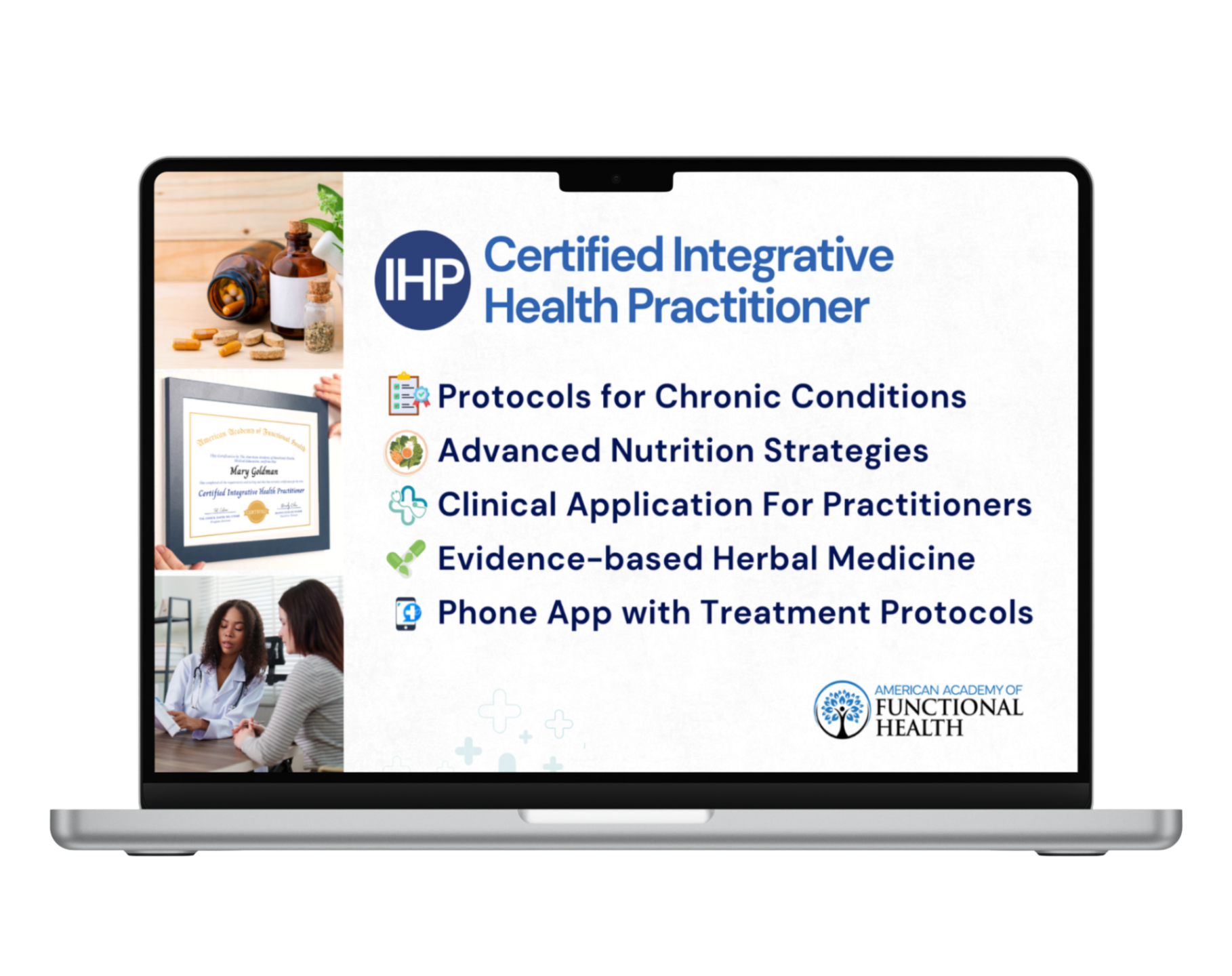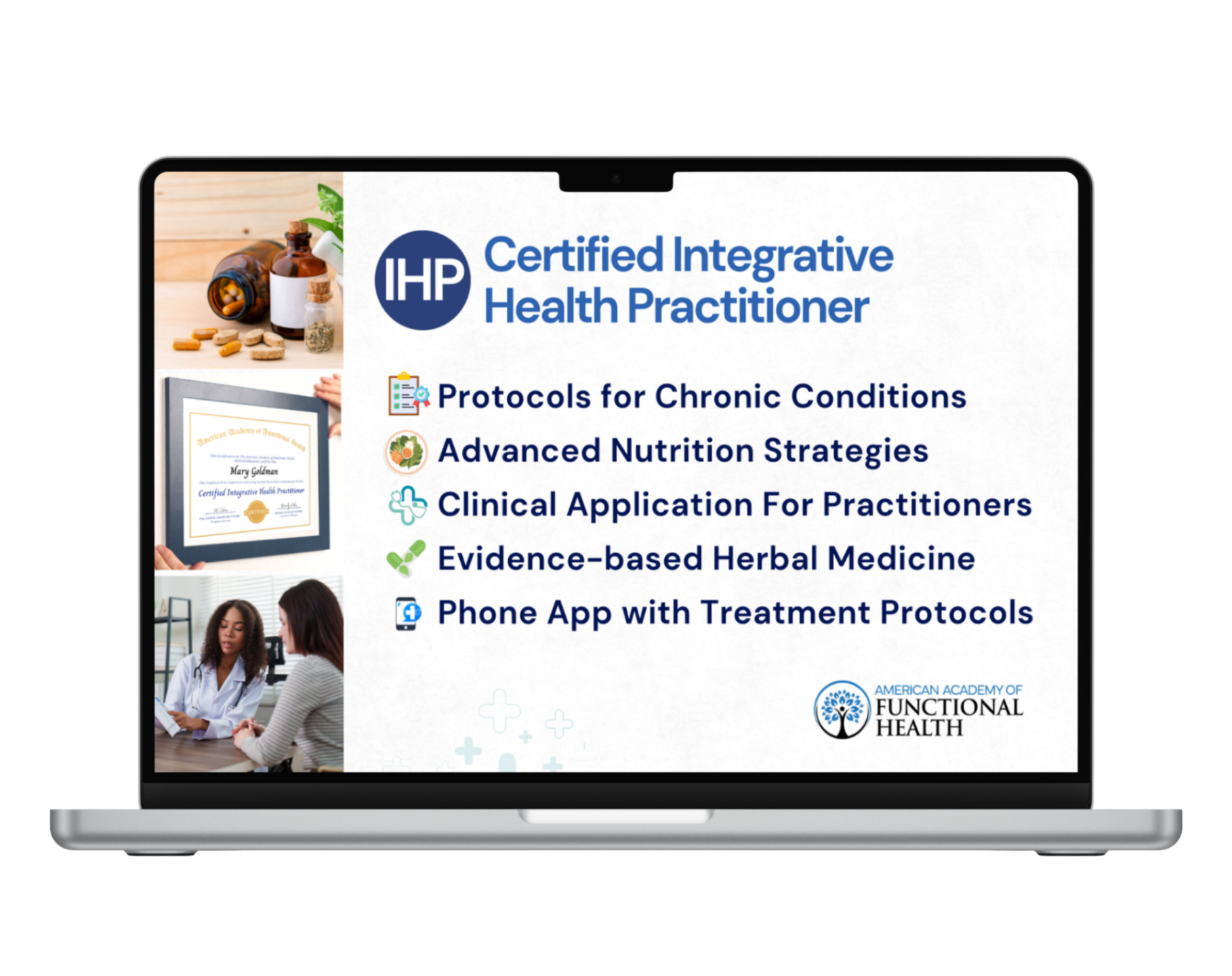Integrative Health Practitioner (IHP)
Certification
(100% Online, 10 Weeks, Live & On-demand Clinical Training)
The Critical Role of Vitamin D
Vitamin D is more than just a nutrient—it's a hormone-like compound essential for immune regulation, bone health, and overall well-being. Yet, vitamin D deficiency is surprisingly common, especially among older adults and those with limited sun exposure (Amrein et al., 2020). In this article, we'll explore the sources, metabolism, health benefits, and risks of low vitamin D levels, along with actionable tips for optimizing your intake.
Why Vitamin D Is Essential for Immune Health
Vitamin D plays a major role in maintaining a healthy immune system. It helps regulate both innate and adaptive immune responses, meaning it helps your body fight off infections while also preventing overactive immune reactions that can trigger autoimmune conditions (Aranow, 2011; Rolf et al., 2022).
Research shows that vitamin D helps: • Suppress chronic inflammation by downregulating nuclear factor-kappa B (NF-κB) activity • Decrease production of inflammatory cytokines such as interleukin-6 (IL-6), interleukin-12 (IL-12), interferon-gamma, and tumor necrosis factor-alpha (TNF-α) • Increase anti-inflammatory cytokines like interleukin-10 (IL-10), which supports regulatory T cell (Treg) function (Sassi et al., 2018)
This immunomodulatory effect explains why vitamin D is being studied for its potential role in preventing and managing autoimmune diseases and chronic inflammatory disorders (Bui et al., 2021).
Common Food Sources of Vitamin D
While your body can produce vitamin D when exposed to sunlight, dietary sources also play an important role—especially for individuals with limited sun exposure.
Here are some of the best natural and fortified sources of vitamin D:
- Fatty fish (salmon, mackerel, sardines)
- Fortified dairy products and plant-based milks (almond, soy, coconut)
- Fortified cereals and orange juice
- Egg yolks
- Cheese
- Beef liver and other organ meats
- Mushrooms (a source of vitamin D2)
Vitamin D2 vs. D3: What's the Difference?
There are two primary forms of vitamin D:
- Vitamin D2 (ergocalciferol) – Found in plant sources like mushrooms
- Vitamin D3 (cholecalciferol) – Synthesized by the skin from sunlight and found in animal-based foods and most supplements
Although some argue that D3 is more bioavailable, both forms are effective at raising vitamin D levels in the body.
How Your Body Metabolizes Vitamin D
Vitamin D synthesis and activation involve a complex pathway:
- Sunlight exposure triggers the conversion of 7-dehydrocholesterol in the skin to pre-vitamin D3.
- Vitamin D3 is then converted in the liver to 25-hydroxyvitamin D [25(OH)D], also known as calcidiol.
- In the kidneys, 25(OH)D is converted to 1,25-dihydroxyvitamin D [1,25(OH)2D], the active form of vitamin D (calcitriol), via the enzyme 1-alpha-hydroxylase (Bui et al., 2021).
This process is dependent on proper liver and kidney function, making those organs essential for maintaining adequate vitamin D levels.
Health Risks of Vitamin D Deficiency
Vitamin D deficiency is defined as serum levels of 25(OH)D below 75 nmol/L (30 ng/mL). Studies estimate that vitamin D deficiency affects approximately 41.6% of US adults, with significantly higher rates among certain populations (Forrest & Stuhldreher, 2011). Recent global analyses indicate that 30–50% of middle-aged and older adults are deficient, even if they appear otherwise healthy (Cashman et al., 2016).
Conditions Linked to Low Vitamin D:
- Multiple sclerosis (MS) • Rheumatoid arthritis (RA) • Hypertension • Cardiovascular disease • Several cancers • Chronic inflammatory diseases • Metabolic syndrome • Obesity and insulin resistance (Bui et al., 2021; Sassi et al., 2018)
High-Risk Groups for Deficiency:
- Individuals with dark skin tones (higher melanin reduces UVB absorption) • Older adults • People with limited sun exposure (e.g., indoor lifestyles) • Those with chronic diseases affecting the liver, kidneys, or digestive system • People on certain medications like anticonvulsants • Individuals with magnesium deficiency, which impairs vitamin D metabolism (Forrest & Stuhldreher, 2011; StatPearls, 2023)
How to Optimize Your Vitamin D Levels
1. Get Sunlight Exposure
Just 15 minutes per day of sun exposure to the arms, face, and legs can significantly boost your vitamin D production. However, sunscreen, clothing, and geographic location can limit this benefit.
2. Eat a Vitamin D-Rich Diet
Incorporate the foods listed above regularly, especially fatty fish, fortified products, and egg yolks.
3. Supplement When Necessary
For many people, especially those with chronic inflammation or autoimmune issues, 1,000–2,000 IU/day of vitamin D3 may be needed. Remember, the impact is gradual—effects may take weeks or months to manifest (Amrein et al., 2020).
4. Don't Forget Magnesium
Vitamin D requires magnesium for proper activation. Up to 50% of Americans are magnesium deficient, which may render vitamin D supplements ineffective. Focus on magnesium-rich foods like: • Dark leafy greens • Nuts and seeds • Legumes • Whole grains • Avocados
5. Support Gut Health
Since vitamin D is absorbed in the gut, digestive conditions like Crohn's disease, ulcerative colitis, and celiac disease can interfere with absorption. Treating gut inflammation and optimizing digestion are crucial for vitamin D utilization.
Final Thoughts
Vitamin D is vital for immune regulation, bone strength, and chronic disease prevention (Aranow, 2011; Rolf et al., 2022). Yet, millions of people unknowingly suffer from deficiency due to inadequate sun exposure, poor diet, or underlying health issues. By understanding the key sources, biological roles, and risk factors for vitamin D deficiency, you can take proactive steps to improve your levels and overall health.
References
Amrein, K., Scherkl, M., Hoffmann, M., Neuwersch-Sommeregger, S., Köstenberger, M., Berisha, A. T., Martucci, G., Pilz, S., & Malle, O. (2020). Vitamin D deficiency 2.0: An update on the current status worldwide. European Journal of Clinical Nutrition, 74(11), 1498-1513. https://doi.org/10.1038/s41430-020-0558-y
Aranow, C. (2011). Vitamin D and the immune system. Journal of Investigative Medicine, 59(6), 881-886. https://doi.org/10.2310/JIM.0b013e31821b8755
Bui, L., Zhu, Z., Hawkins, S., Cortez-Resendiz, A., & Bellon, A. (2021). Vitamin D regulation of the immune system and its implications for COVID-19: A mini review. SAGE Open Medicine, 9, 20503121211014073. https://doi.org/10.1177/20503121211014073
Cashman, K. D., Dowling, K. G., Škrabáková, Z., Gonzalez-Gross, M., Valtueña, J., De Henauw, S., Moreno, L., Damsgaard, C. T., Michaelsen, K. F., Mølgaard, C., Jorde, R., Grimnes, G., Moschonis, G., Mavrogianni, C., Manios, Y., Thamm, M., Mensink, G. B., Rabenberg, M., Busch, M. A., ... Kiely, M. (2016). Vitamin D deficiency in Europe: Pandemic? American Journal of Clinical Nutrition, 103(4), 1033-1044. https://doi.org/10.3945/ajcn.115.120873
Forrest, K. Y., & Stuhldreher, W. L. (2011). Prevalence and correlates of vitamin D deficiency in US adults. Nutrition Research, 31(1), 48-54. https://doi.org/10.1016/j.nutres.2010.12.001
Rolf, L., Muris, A. H., Hupperts, R., & Damoiseaux, J. (2022). An update on the effects of vitamin D on the immune system and autoimmune diseases. International Journal of Molecular Sciences, 23(17), 9784. https://doi.org/10.3390/ijms23179784
Sassi, F., Tamone, C., & D'Amelio, P. (2018). Vitamin D: Nutrient, hormone, and immunomodulator. Nutrients, 10(11), 1656. https://doi.org/10.3390/nu10111656
StatPearls. (2023). Vitamin D deficiency. StatPearls Publishing. https://www.ncbi.nlm.nih.gov/books/NBK532266/

What healthcare practitioners are saying about our classes:
A 10-Week Certification Program That Includes...

PROTOCOLS FOR CHRONIC DISEASES & SYMPTOMS
Evidence-Based Nutritional and Herbal Compounds that are simple and affordable and can support relief from chronic conditions and symptoms.

FOOD AS MEDICINE
How to Use Dietary and Lifestyle Medicine as Clinical Interventions to help your patients improve their health and function using dietary patterns, physical activity, sleep optimization, and stress resilience techniques.

MASTER PRECISION MEDICINE
Creating a Personalized Treatment Plan For Patients with Cardiovascular, Gastrointestinal, Musculoskeletal, and Autoimmune Conditions

DON'T FORGET HEALTH OPTIMIZATION
Special Training on Healthy Metabolism, Body Weight, and Women's Health at Different Stages of Life with Integrative Medicine

INTEGRATIVE MEDICINE FOR YOUNG PATIENTS
Learn Integrative (drug-free) Treatment Protocols for Common Pediatric Conditions (including flu, ear infections, Sore throat, UTI, Hand, foot & Mouth, Pink eye, and supporting healthy immune function)

✔ Get 24/7 Access to All Classes
✔ Weekly Live Class to Advance Your Skills
✔ Get Certified in 10 Weeks
✔ Bonus Package Included (see below)

BONUS #1 EASY & FAST ACCESS TO ALL YOUR PROTOCOLS
Access to a Unique Phone App with Treatment Protocols for Hundreds of Chronic Adult & Pediatric Conditions
(3-Year Access Included as a gift)

BONUS #2 INTEGRATIVE MEDICINE CLINICAL GUIDE
A Clinician's Guide To Applying Clinical Nutrition & Herbal Medicine.

BONUS #3 WATCH & REVIEW AGAIN ANYTIME
Access to all the recorded classes and case studies for 12 months

Clinical Tools, Treatment Frameworks, and Real-world Strategies
10-Week Curriculum Overview
Week 1: Clinical Foundation & Food As Medicine
- Explore in depth the foundations of health, wellness, and restoration of function through an integrative framework that combines clinical nutrition, botanical medicine, lifestyle strategies, and mind-body approaches.
- Learn how these modalities work together to prevent and address chronic disease while supporting resilience and vitality.
Week 2: Cardiovascular Health
- Gain practical tools for the prevention and integrative management of hypertension, dyslipidemia, coronary artery disease, and heart failure.
- Review evidence-based nutrition, botanicals, and lifestyle interventions that promote vascular health and post-stroke recovery.
Week 3: Metabolic Health, Diabetes & Kidney Function
- Learn specific protocols for patients with insulin resistance, diabetes, obesity, and chronic kidney disease.
- A special class on Functional Blood Chemistry shows how to apply targeted nutritional and botanical strategies to restore abnormal cardiometabolic, kidney, and lipid biomarkers.
Week 4: Gastrointestinal Disorders
- Learn specific protocols for patients with GERD, IBS, constipation, diarrhea, ulcers, and fatty liver disease.
- Discuss key concepts in malabsorption and digestive dysfunction, including low stomach acid, pancreatic and bile insufficiency, and explore therapeutic strategies to support digestion, nutrient absorption, and microbiome balance.
Week 5: Thyroid & Women’s Hormonal Health
- Explore integrative approaches to hypothyroidism, PMS, PCOS, perimenopause, and menopause.
- Understand how nutrition, stress, circadian rhythm, and endocrine-disrupting exposures influence hormonal balance—and how to restore it using adaptogenic herbs and lifestyle medicine.
Week 6: Chronic Pain & Musculoskeletal Health
- Gain practical tools to address chronic joint pain, osteoarthritis, fibromyalgia, muscle pain, and neuropathy through a whole-person, integrative approach.
- Learn nutritional and botanical therapies for inflammation modulation, mitochondrial support, and joint restoration.
Week 7: Immune Balance & Autoimmune Conditions
- Learn strategies for supporting healthy immune function and understanding the impact of diet and lifestyle on immune dysregulation (e.g., IL-6 vs. IL-10).
- Explore approaches for restoring immune balance in post-COVID patients and review treatment protocols for autoimmune conditions, including rheumatoid arthritis, psoriasis / psoriatic arthritis, lupus, and multiple sclerosis (MS).
Week 8: Mental Health & Mood Disorders
- Take an integrative approach to depression, anxiety, PTSD, and postpartum mood disorders.
- Discover nutritional psychiatry, botanicals for mood and sleep, and lifestyle strategies that promote neurotransmitter balance and emotional resilience.
Week 9: Healthy Aging & Geriatric Health
- Explore the physiology of aging and evidence-based approaches to preserve vitality.
- Learn practical interventions for cognitive decline, dementia, osteoporosis, and sarcopenia, focusing on nutrition, movement, and hormonal support for longevity and quality of life.
Week 10: Food as Medicine & Integrative Management Strategies
- Apply everything you’ve learned through real-world case studies and clinical frameworks.
- Explore natural solutions for hormonal imbalances, the use of peptide therapy, and practical steps for growing a successful Integrative Medicine practice.
- Review an Integrative Medicine flow model—from dietary and lifestyle assessment to social support and readiness for change—using a simple structure of one dietary, one lifestyle, and three supplement recommendations, followed by a strategic follow-up plan.
- Cover the clinical application, pros, and cons of the most common diets, including when each approach may be indicated or contraindicated based on patient presentation and physiology.
Program Cost: $4,500
Healthcare provider scholarship includes a discount of $2,100!
Bringing the price to just $2,400
Apply For Program + Scholarship
-
You want multiple treatment options—like herbal and nutritional supplements— to support patients with chronic pain, cardiometabolic, autoimmune, women's health, geriatric, and mood disorders.
-
You want evidence-based dietary and lifestyle recommendations that complement medications and create real results—without guesswork or endless theory.
-
You want to become the go-to practitioner in your community who attracts committed patients and builds a thriving practice while learning at your own pace.
Presenters with Years of Clinical Experience

Dr. Asia Muhammad, ND
Dr. Asia Muhammad, ND, is a board-certified Naturopathic Doctor dedicated to bridging science and natural medicine. She earned her Bachelor’s degree in Chemistry and Biology from Middle Tennessee State University and her Doctorate of Naturopathic Medicine from Southwest College of Naturopathic Medicine and Health Sciences (SCNM) in Tempe, Arizona—an accredited medical institution that integrates both naturopathic and conventional medical approaches to healing.
After graduating in 2014, Dr. Asia completed a two-year residency in Integrative Medicine in Arizona, where she gained extensive experience in the evaluation and treatment of chronic diseases. Since then, she has continued her work in private practice, providing personalized, evidence-based care to support long-term wellness.
Her work has been published in leading journals, including Integrative Medicine: A Clinician’s Journal and the Journal of Natural Medicine. She also co-hosted the Amazon Prime award-winning docuseries The Art of Natural Healing, highlighting the power of evidence-based natural therapies.
Dr. Asia integrates clinical nutrition, botanical medicine, and lifestyle interventions to create individualized treatment plans tailored to each patient’s unique needs. A passionate advocate for Integrative Health, she empowers her patients to take an active role in prevention, healing, and sustainable self-care.

Dr. Matthew Cavaiola, ND, MS
Dr. Matthew Cavaiola is a naturopathic physician with 17 years of clinical experience in Functional, nutritional, and herbal medicine. He specializes in cardiometabolic conditions, detoxification, and men’s health.
He received a Bachelor’s Degree in Biology and a Master’s Degree in Human Nutrition from the University of Delaware, a Master's Degree in Acupuncture, and a Doctorate Degree in Naturopathic Medicine. He has been practicing as a Functional and integrative medicine physician for 17 years and was also an adjunct professor at the Sonoran University of Health Sciences and Bastyr University.

Tal Cohen, DAOM, MS
Tal Cohen, DAOM, MS-HNFM is an author and presenter with over 16 years of clinical experience with integrative, nutritional, and Eastern and Western herbal medicine.
He developed multiple Functional and Nutritional medicine programs, lectured nationwide, and is the author of several books and patient guides, including “Treating Pain and Inflammation with Functional Medicine: The Complete Clinical Guide” and “The Complete Guide to Removing Toxins & Improving Your Health.”
Tal completed a Master of Science in Human Nutrition and Functional Medicine and a Doctorate in Acupuncture and Oriental Medicine.

Dr. Chil Khakham, ND, MBA
Dr. Chil is a naturopathic physician with additional training in Functional Medicine, functional endocrinology, and functional blood chemistry.
His education includes a Bachelor of Science, a Master of Business Administration, and a Doctorate in Naturopathic Medicine.
Dr. Chil developed several Functional medicine programs and established and developed several successful brick-and-mortar and virtual practices.

Jessica Knese, MS, CNS
Jess graduated from the University of Colorado with a dual bachelor's degree in Integrative Physiology and Psychology and a Master's of Science in Clinical Nutrition and Integrative Health from Maryland University of Integrative Health. Jess is also a Certified Nutrition Specialist and has been working in several Functional and integrative medicine clinics with primary care providers who implement nutrition into their practice.
The Integrative Health Practitioner Certification Program
December 1st 2025

00
DAYS
00
HOURS
00
MINS
00
SECS
A COMPREHENSIVE PACKAGE
What's Included in the Program...
Register now and receive our comprehensive package and bonuses:
✅ Live Weekly Classes + Recordings — Engage in live training sessions and access all recordings anytime.
✅ Treatment Protocols for Common Conditions — Covering cardiovascular, metabolic, gastrointestinal, endocrine, musculoskeletal, immune, mental health, women's, and geriatric conditions, using evidence-based nutritional, botanical, and lifestyle medicine.
✅ Downloadable PDF Handouts for every class.
✅ Clinical Guides & Patient Resources to apply what you learn in practice.
✅ Private Member Portal with one-year access to all course materials and recordings.
✅ Printable Grocery Lists aligned with recommended nutritional protocols.
✅ Healthy Cooking eBook (Branded for Your Clinic) featuring simple, evidence-based recipes for patient support.
✅ Functional Medicine Phone App (1-Year PRO Access) — Instant access to protocols for hundreds of chronic conditions.
✅ Nursing Continuing Education (20 CEs) — Accepted in 46 out of 50 U.S. states.
✅ Printed Certification of Completion to showcase your new credentials.
✅ Lifetime Listing in Our Providers’ Directory to enhance your professional visibility.
✅Dedicated Phone app with treatment protocols for hundreds of adult and pediatric conditions
Program Cost: $4,500
Healthcare provider scholarship includes a discount of $2,100!
Bringing the price to just $2,400
Apply For Program + ScholarshipFrequently Asked Questions
Who can register to this program?
How long does it takes to get certified?
Why should I register for this program?
What if I cannot attend the 1hr live class every week?
Will I learn about the treatment protocols?
Who is the creator of the Integrative Health Practitioner Program?
I have additional questions. Who can I contact?
Apply For Program + Medical Scholarship
Schedule a short call with an academic advisor
The Integrative Health Practitioner
Certification Program
Starting December 1st 2025

00
DAYS
00
HOURS
00
MINS
00
SECS
